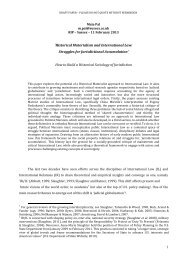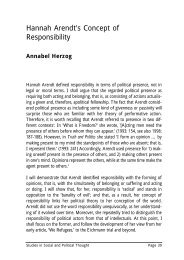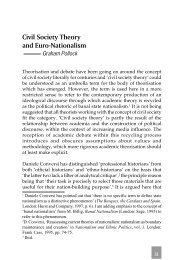Just a Matter of Choice? Student Mobility as - University of Sussex
Just a Matter of Choice? Student Mobility as - University of Sussex
Just a Matter of Choice? Student Mobility as - University of Sussex
Create successful ePaper yourself
Turn your PDF publications into a flip-book with our unique Google optimized e-Paper software.
employees, but also open to others (cf.<br />
Hayden 2006: 18-19). When remembering<br />
how it came to their starting their BA degree<br />
at a British university, both <strong>of</strong> them refer to<br />
the school, to the other pupils there and to<br />
the role teachers played in the process:<br />
Why I decided not to orient myself from<br />
Brussels back to Germany but towards<br />
the UK? […] I would have to say that it<br />
had to do with outstanding conditions<br />
[…] at the European School. For<br />
example, our English lessons were<br />
taught by native speakers, i.e. teachers<br />
from England, who in our final year, our<br />
l<strong>as</strong>t year at school, provided us [...] with<br />
the UCAS application forms and<br />
explained them to us, <strong>as</strong> well <strong>as</strong><br />
<strong>as</strong>sisting us with our individual<br />
applications. There w<strong>as</strong> a great deal <strong>of</strong><br />
support and information <strong>as</strong> well. As a<br />
consequence, more than half <strong>of</strong> my<br />
German-speaking cl<strong>as</strong>s at the<br />
European School went to the UK. Thus,<br />
it w<strong>as</strong> almost a, not just almost, the<br />
majority didn‟t go to Germany to study,<br />
but to the UK. Like many from the<br />
European School went to the UK<br />
anyway, not just those from the<br />
German-speaking cl<strong>as</strong>s. (Georg)<br />
[…] there were others in my cl<strong>as</strong>s <strong>as</strong><br />
well who had also thought about going<br />
to England […]. So there had been<br />
discussions with other fellow pupils. […]<br />
We also had... there w<strong>as</strong> an English<br />
teacher at school who always looked<br />
after the students very well, in the<br />
sense that he gave us information, told<br />
us how the application process worked.<br />
And I can still remember, it w<strong>as</strong>... he<br />
also – when you submit your UCAS<br />
application, you need some sort <strong>of</strong><br />
reference, […] and he wrote my<br />
reference. Even though he w<strong>as</strong>n‟t my<br />
English teacher, he <strong>as</strong>sumed the<br />
responsibility <strong>of</strong> talking to various<br />
teachers and then writing the reference<br />
for me for the university. [ponders]<br />
Well, I suppose that also must<br />
have played a role, somebody<br />
being there, you know, who<br />
provided us with information and<br />
ultimately facilitated the whole thing for<br />
us. (Felix)<br />
In spite <strong>of</strong> the slight differences in the way<br />
both respondents recount the p<strong>as</strong>t<br />
situation, their quotes clearly convey that<br />
the teachers‟ actions had a pre-structuring<br />
effect for directing these pupils towards a<br />
British rather than a German university.<br />
Especially Georg‟s account with its<br />
emph<strong>as</strong>is on the teachers‟ actions, and on<br />
how he w<strong>as</strong> part <strong>of</strong> a majority <strong>of</strong> pupils<br />
doing the very same thing, conveys how<br />
going to the UK appeared <strong>as</strong> a very „natural‟<br />
thing given the circumstances. Thus, in a<br />
way, his example is quite complementary to<br />
those respondents mentioned before<br />
whose actions were determined by doing<br />
something in contr<strong>as</strong>t to others. Later on in<br />
the interview, Georg compares his path to<br />
Oxford with that <strong>of</strong> other Germans he<br />
became friends with there, acknowledging<br />
again the influential role the school played:<br />
Many <strong>of</strong> my friends, also in Oxford, who<br />
went there, took a bit longer to latch<br />
onto the idea <strong>of</strong> applying there; at<br />
school in Germany, they weren‟t at all,<br />
they weren‟t even helped with the<br />
application, they weren‟t even given the<br />
idea. Well, this needs to come into<br />
one‟s mind in the first place. Why<br />
should I go to the UK?... In Germany, I<br />
think, it is still the first reflex – quite<br />
normal anyway, isn‟t it – to orient<br />
oneself within Germany. (Georg)<br />
Previous research on the children <strong>of</strong><br />
diplomats, expatriates or other<br />
transnationally mobile pr<strong>of</strong>essionals h<strong>as</strong><br />
highlighted the important role educational<br />
institutions play in the formation and social<br />
reproduction <strong>of</strong> what is <strong>of</strong>ten called a<br />
„transnational capitalist cl<strong>as</strong>s‟ (Sklair 2001)<br />
by providing them with a cosmopolitan (or<br />
at le<strong>as</strong>t „European‟) outlook on the world<br />
and a thereby <strong>as</strong>sociated habitus, <strong>as</strong> well<br />
<strong>as</strong> fulfilling important networking functions<br />
for these communities (Hayden 2006;<br />
Shore and Baratieri 2006; Waters 2007;<br />
Moore 2008). But the scenario<br />
remembered by Georg and Felix further<br />
suggests that research should also take a<br />
14

















